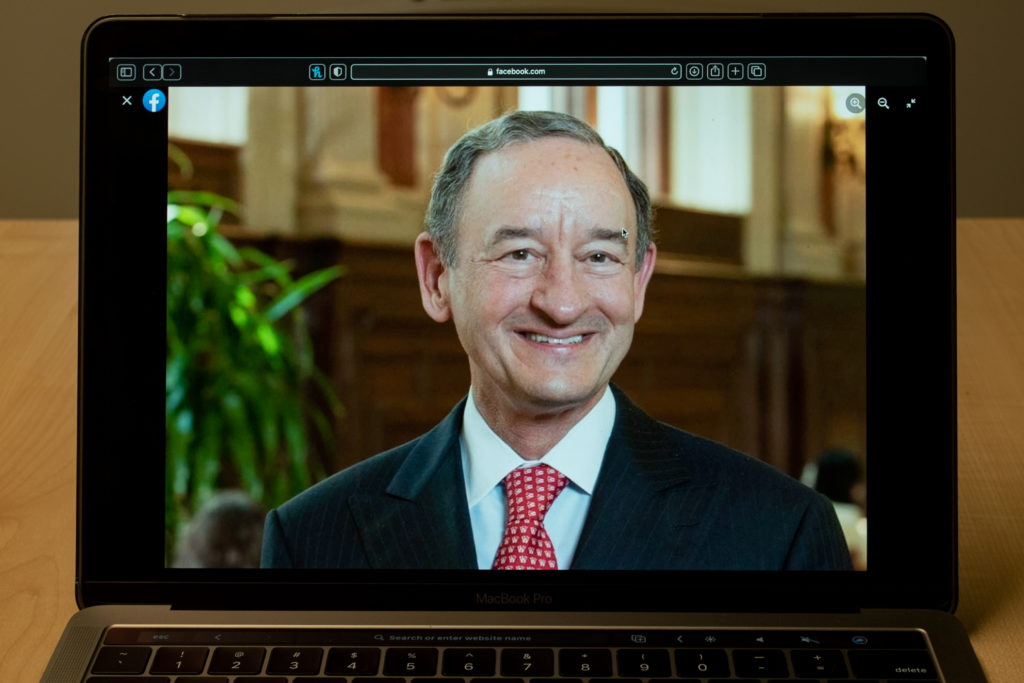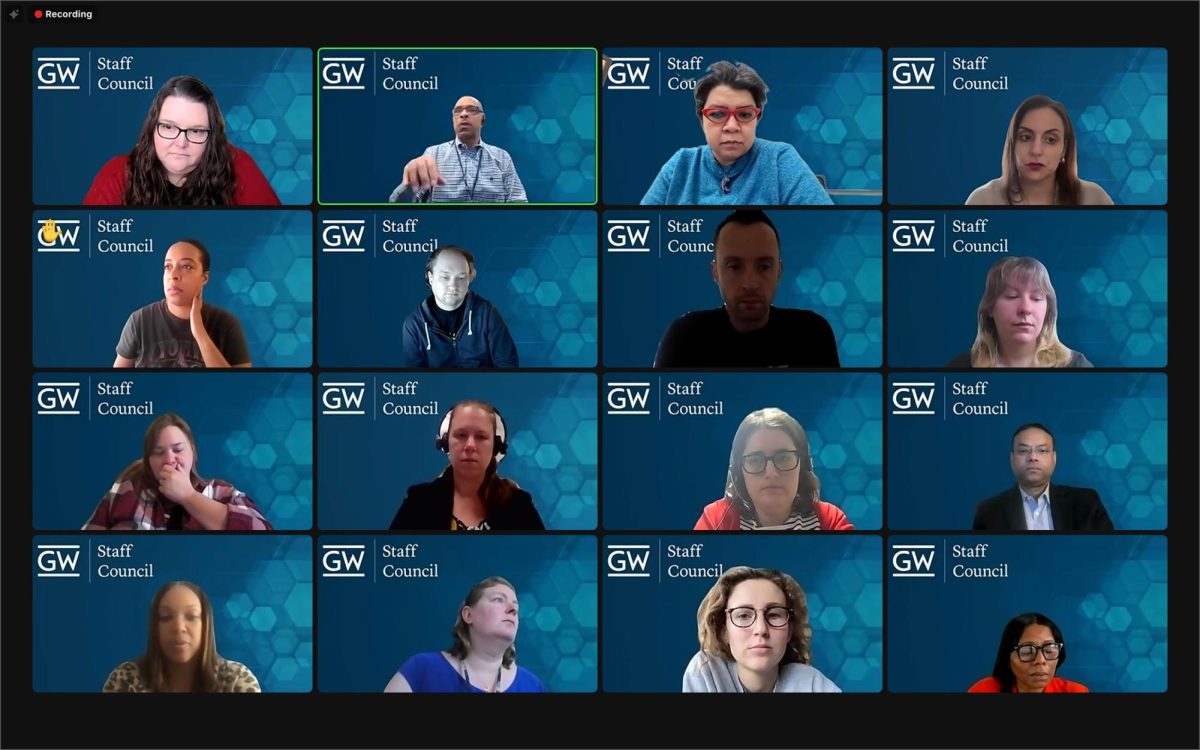Updated: Sept. 20, 2021 at 1:29 p.m.
Half a dozen experts in higher education administration said Mark Wrighton, the University’s incoming interim president, could establish a long-term shared governance plan for GW even during his expected short tenure at the University.
Board of Trustees Chair Grace Speights announced at a Faculty Senate meeting earlier this month that officials will replace outgoing University President Thomas LeBlanc with Wrighton – the former chancellor of Washington University in St. Louis – effective Jan. 1. Experts said Wrighton is an experienced and qualified leader who can improve shared governance among faculty, staff and administrators while officials conduct a full presidential search.
Speights said officials were not in a position to conduct a search for LeBlanc’s replacement before the end of his contract next summer because of a lack of talented long-term candidates, ongoing concerns over shared governance and distrust between faculty and University leaders.
“Maybe we’ll be lucky, maybe the market will be better, maybe we can have somebody in the summer or for the fall,” Speights said at the senate meeting. “I doubt that, but maybe.”
At the meeting, faculty senators also discussed a report some senators produced to outline ways to improve shared governance. Speights had announced in May that the Board would review the Faculty Code to determine “appropriate avenues” for faculty input.
Wrighton served as provost of the Massachusetts Institute of Technology for five years, starting in 1990 before assuming the role of chancellor of WashU in 1995 and stepped down to an emeritus position in 2019. As chancellor, Wrighton simultaneously held top roles at the American Association of Universities, Business-Higher Education Forum and the Consortium on Financing Higher Education.
During his chancellorship, the institution’s endowment grew by nearly $5 billion, and student applications increased by more than 200 percent.
Wrighton faced criticism in 2008 when WashU officials bestowed alumna Phyllis Schlafly, a conservative activist and outspoken opponent of abortion, same-sex marriage and the Equal Rights Amendment, with an honorary doctorate. He later released a statement saying he strongly disagrees with many of Schlafly’s personal views.
Wrighton also drew criticism from students and faculty when he refused to divest the university’s endowment from fossil fuel-based companies in April 2017. GW’s Board of Trustees announced in June 2020 that officials would divest the University’s endowment from carbon-based stocks by 2025 after years of student activism.
Experts said Wrighton’s prior experience in higher education sets him up to effectively lead the University as it emerges from the COVID-19 pandemic, but he’ll likely focus on short-term projects and improvements instead of long-term goals.
Gary Rhoades, a professor of higher education at the University of Arizona, said given LeBlanc’s tumultuous tenure, Wrighton will likely assist in working to “stabilize” the University.
“Part of the role of an interim president is to say ‘OK, let’s catch our breath here, this is a really hard time, let’s focus on getting through this academic year’ and give faculty and the Board an opportunity to start the search process that will lead to a permanent leader who will have more opportunity to succeed,” Rhoades said.
He said interim university presidents generally do not try to reshape long-term policy or launch major fundraising campaigns while in office but usually work to keep the institution steady.
“It’s less a function of that interim president’s vision and more a function of their understanding and assessment of the condition of the institution and its trajectory,” Rhoades said.
David Farris, the executive director of safety and emergency management at George Mason University who has published a book on higher education governance, said Wrighton and other officials should use the interim presidential period to commit to “transparency and collaboration” as the Board looks to construct a more “inclusive” shared governance structure.
“You can’t have a really firm, hierarchical-authoritarian president if the Board of Trustees is looking for persons to be inclusive,” Farris said.
He said interim university presidents tend to be “more collaborative and inclusive” of their communities than longer-term leaders because they exist to maintain stability on campus for a limited period of time.
“An interim president oftentimes might be in a position where they need to be a little bit more collaborative because they don’t have the permanence that the long-term presidents can have,” Farris said.
Aaron Benavot, a professor of global educational policy at the State University of New York at Albany, said a leader with a resume of long-term experience like Wrighton’s could pursue more “innovative” policies given his expertise and credibility from previous positions.
“An interim president who obviously has a long and a fairly stellar academic and administrative history behind him – having served as chancellor at a very prestigious system – would be given a little bit more leeway and degrees of freedom to pursue and initiate some innovative programs,” he said.
Spencer Niles, a professor of counselor education and a co-director of the THRIVE Research and Intervention Center at the College of William and Mary, said there have been a large number of retirements and departures from higher education institutions in the United States since the start of the pandemic, which has delayed administrative recruitment.
“It’s been a real challenge, and a lot of people have decided ‘Maybe I’ll retire’ or ‘Maybe I’ll go back to the faculty,'” he said.
Niles said administrators are “setting the stage” for University community members to discuss shared governance and administrative reforms during the interim presidency.
“It sounds like what’s been in place has been more of a traditional type of leadership scenario, and perhaps the faculty have not felt as involved or engaged, and perhaps they feel their voices have not been asked for,” Niles said.
José Luis Chávez, a clinical professor of education and the director of the higher education leadership program at Drexel University’s School of Education, said Wrighton is “absolutely” qualified to lead GW through an interim period given his past experience.
“You want somebody that’s been in that seat and that has been responsible for multiple initiatives at a university, that has a proven record, that has the experience and the skill set and knowledge and ability to operate,” Chávez said.
This post has been updated to correct the following:
The Hatchet incorrectly spelled Benavot’s last name. The correct spelling is now reflected. We regret this error.






